Films You Need to See: PAUL WILLIAMS: STILL ALIVE
A story of redemption, brotherhood, gratitude, and trust.
I’m so fascinated by this 2011 documentary called PAUL WILLIAMS: STILL ALIVE I had to hunt down a used DVD library discard to have my own copy, for it’s not streaming anyplace and otherwise hard to track down. You can rent it though, and it’s worth your time and attention. Many critics, and especially the Letterboxd community of movie fans, have dissed it — but I think they’ve largely missed the point of it.
Academy Award-winning singer/songwriter Paul Williams himself is a national treasure. His career is so vast and varied, his work will land differently for different people, in particular anyone who lived through the 1970s when he was at his peak of his popularity. What means the most to me is that he wrote the songs for THE MUPPET MOVIE, EMMET OTTER’S JUGBAND CHRISTMAS, and PHANTOM OF THE PARADISE, as well as a song for THE SECRET OF NIMH — four of my absolute favourite things in the realm of cinema and television. I’ve grown up with him, even when I didn’t realize it.
PAUL WILLIAMS: STILL ALIVE is a project by filmmaker Stephen Kessler, who decides to try making a film about his childhood hero Paul Williams and ends up going down a very surprising and unexpected path. The documentary becomes less about its subject and becomes more about the process behind its very own making, and the relationship that evolves between Williams and Kessler.
Many people are turned off by Kessler’s personality and the idea that he inserts himself into the film to seemingly make it more about him than about Williams. What they fail to realize is that Williams himself is the one who encourages Kessler to put himself into the picture. At its core, through Williams’ own orchestration, he practically directs the movie for Kessler, resulting in an organic trajectory of storytelling where a thread of redemption & recovery leads these two artists to discover friendship and epiphanies along the way. It feels like Williams recognizes his own former loneliness, catharsis, and delusion in Kessler’s naive view of the world, and through love and friendship, Williams shows Kessler what life is really all about.
I think it was easy for me to buy in to Kessler’s obsession with Paul Williams from the very beginning, because he’s my hero too. STILL ALIVE makes me admire him even more. I mean, who wouldn’t want to be best friends with the guy who wrote The Rainbow Connection?
One of the things that Kessler overlooks and doesn’t understand through his interactions with Williams is how much of a toll his addictions to drugs and alcohol through the late ‘70s and through ‘80s took on his personal life and career. Today, Williams has been sober for decades and devotes much of his life to supporting others towards recovery. He’s realistic and candid with Kessler about how normal and innocent the drug culture was in those days, snarking to him “that’s what we did in those days, young man.” Kessler responds with a half-hearted “yeah….” but it takes him awhile to fully realize the full effect of destructiveness it had.
For Kessler, his own addiction is one that’s much more subtle, and one we all suffer from in the social media age: to be liked, let alone be loved. We crave constant dopamine hits from likes and comments on our posts. We feel isolated and alone, wanting to feel special and validated. Kessler, with a few feature films and an Oscar nomination under his belt, has been burned out by the film industry just enough that he’s starting to get an inkling of the shallowness that chasing fame can bring. But pipe dreams are hard to let go of.
A giant like Williams, who reached the highest peaks of fame that one can achieve in the entertainment business, is like a monolith of wish fulfillment for Kessler. So he can’t understand why he seems so much “happier” playing in casinos and small clubs instead of appearing on Johnny Carson for the umpteenth time. He cries out to Williams how it was possible for him not to be freaking out when his fame and glory were seeming to dry up. Williams rebukes him saying “I don’t remember that. I remember freaking out when I couldn’t get my dealer on the phone.” He doesn’t realize he’s talking to someone who’s been to hell and lived to tell the tale. He’s talking to someone who’s only “still alive” because he was given a second lease on life through a life of sobriety.
Kessler really doesn’t realize this when he innocently and naively films Williams’ reaction to an old clip from 1982 when he guest-hosts the Merv Griffin show completely smashed on cocaine and unleashing a persona he can only describe as “arrogant, shallow, and ruthless.” It’s a watershed moment for them both, one that turns much of the tide for the lessons they both learn from the whole process.
Anyone eager to dismiss PAUL WILLIAMS: STILL ALIVE may find it useful and inspiring to learn a bit more about how the relationship of Kessler and Williams has blossomed as a result. We only get an inkling of this from the end of the documentary itself. But Williams has described it in post-film discussions & interviews as “from a stalker to a brother.” Thus I not only recommend the film itself whole-heartedly, but also these interviews which flesh out the journey of how it was made.
Williams often says that his life now is built on a foundation of gratitude and trust. He could have filed a restraining order against Kessler during the awkward and strained interactions early on in the filming process. But he chose to trust Kessler, and in turn, Kessler earned that trust by leaving in all of his mistakes, mis-steps, innocent insults and the awkward & clumsy cat-and-mouse game with his childhood idol. And Williams takes the whole thing as a gift to be grateful for. The edits from past to present are skillfully crafted in order to highlight the miracle of his recovery. Warts and all, it simply results in a beautiful friendship, and the film ends with the master songwriter Paul Williams writing a song for the end credits that sums up the whole journey.
I don't know you in those clothes
I don't know you with that hair
Two dimensional reflection
Unforgiving unaware
Part time dreamer
Would be player
You thought fame could outrun fear
Something clearly terrified you
Did you choose to disappear?
Guess again
Guess again
You made friends
And some still ask about you
Now and then
Well you sang a pencil promise
That you thought you might erase
Left a fault line on your future
Someday heartache you must face
Earned a black belt in disaster
End up acting like a jerk
It's a fact of life, your final act
Is gonna need some work
Where've you been?
Where've you been?
Learning lessons on the road to hell
And back again
And someone asked me once
Where do we go when we arrive
If you're lucky, when its' over
The dreamer's still alive
A blessed mystery
For sweeter souls did not survive
But if you're lucky, when it's done
Somewhere deep inside
The dreamer's still alive
If you don’t know much about Paul Williams, catch up and delve into his career and his music, but most importantly his philosophy of life and his spirit of kindess. He’s my hero and a rare bird in this crazy world. And watch STILL ALIVE.

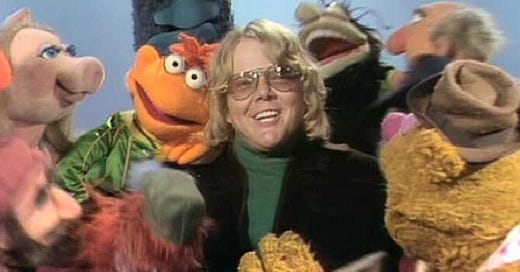



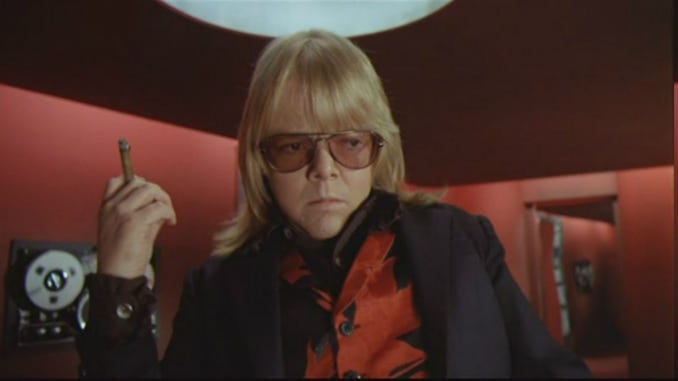
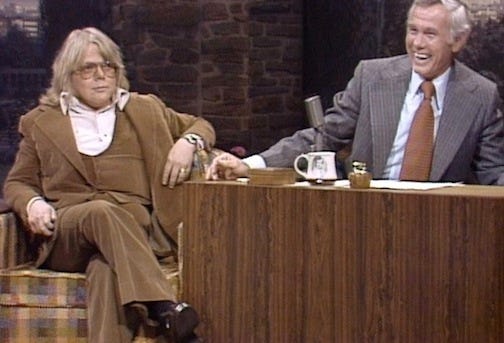
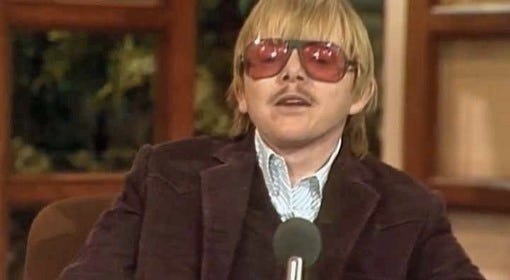
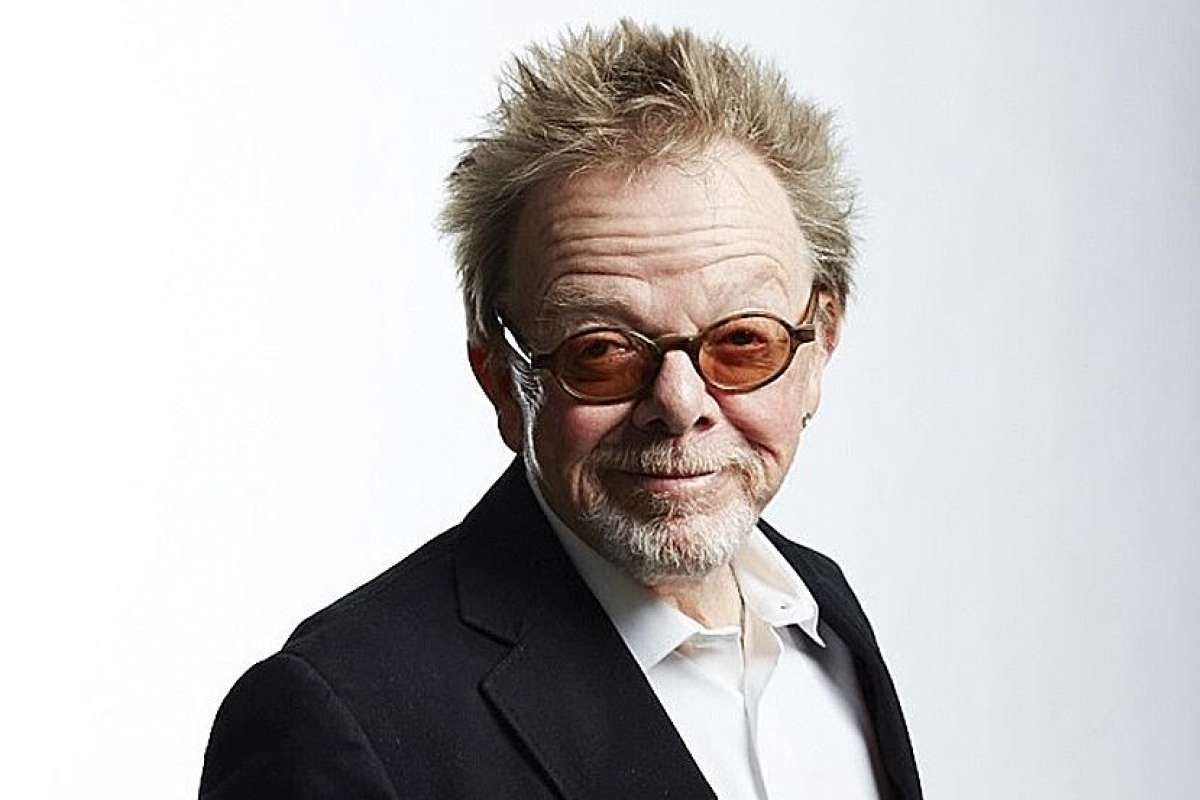
A compelling read. Thank you! I'd love to see a film about Williams starring Toby Jones. I thought the second image in your piece WAS Jones.